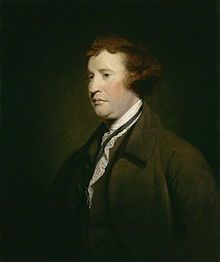Edmund Burke
Those who don’t know history are destined to repeat it.
‘The only thing necessary for the triumph of evil is for good men to do nothing.’
The people never give up their liberties but under some delusion. ~Edmund Burke
From Wikipedia
Edmund Burke 12 January [NS] 1729[1] – 9 July 1797) was an Irish[2][3] statesman born in Dublin; author, orator, political theorist, and philosopher, who, after moving to England, served for many years in the House of Commons of Great Britain as a member of the Whig party.
Mainly, he is remembered for his support of the cause of the American Revolutionaries, and for his later opposition to the French Revolution. The latter led to his becoming the leading figure within the conservative faction of the Whig party, which he dubbed the “Old Whigs”, in opposition to the pro–French Revolution “New Whigs”, led by Charles James Fox.[4]
Burke was praised by both conservatives and liberals in the nineteenth century.[5] Since the twentieth century, he has generally been viewed as the philosophical founder of conservatism.[6][7]
American War of Independence Burke expressed his support for the grievances of the American Colonies under the government of King George III and his appointed representatives. On 19 April 1774 Burke made the speech, On American Taxation (published in January 1775), on a motion to repeal the tea duty:
Burke expressed his support for the grievances of the American Colonies under the government of King George III and his appointed representatives. On 19 April 1774 Burke made the speech, On American Taxation (published in January 1775), on a motion to repeal the tea duty:
Again and again, revert to your old principles—seek peace and ensue it; leave America, if she has taxable matter in her, to tax herself. I am not here going into the distinctions of rights, nor attempting to mark their boundaries. I do not enter into these metaphysical distinctions; I hate the very sound of them. Leave the Americans as they anciently stood, and these distinctions, born of our unhappy contest, will die along with it. … Be content to bind America by laws of trade; you have always done it. … Do not burthen them with taxes. … But if intemperately, unwisely, fatally, you sophisticate and poison the very source of government by urging subtle deductions, and consequences odious to those you govern, from the unlimited and illimitable nature of supreme sovereignty, you will teach them by these means to call that sovereignty itself in question. … If that sovereignty and their freedom cannot be reconciled, which will they take? They will cast your sovereignty in your face. No body of men will be argued into slavery. Sir, let the gentlemen on the other side … tell me, what one character of liberty the Americans have, and what one brand of slavery they are free from, if they are bound in their property and industry by all the restraints you can imagine on commerce, and at the same time are made pack-horses of every tax you choose to impose, without the least share in granting them. When they bear the burthens of unlimited monopoly, will you bring them to bear the burthens of unlimited revenue too? The Englishman in America will feel that this is slavery; that it is legal slavery, will be no compensation either to his feelings or to his understandings.[48]
On 22 March 1775, in the House of Commons, Burke delivered a speech (published during May 1775) on reconciliation with America. Burke appealed for peace as preferable to civil war and reminded the House of America’s growing population, its industry, and its wealth. He warned against the notion that the Americans would back down in the face of force, since the Americans were descended largely from Englishmen:
… the people of the colonies are descendants of Englishmen. … They are therefore not only devoted to liberty, but to liberty according to English ideas and on English principles. The people are Protestants … a persuasion not only favourable to liberty, but built upon it. … My hold of the colonies is in the close affection which grows from common names, from kindred blood, from similar privileges, and equal protection. These are ties which, though light as air, are as strong as links of iron. Let the colonies always keep the idea of their civil rights associated with your government—they will cling and grapple to you, and no force under heaven will be of power to tear them from their allegiance. But let it be once understood that your government may be one thing and their privileges another, that these two things may exist without any mutual relation—the cement is gone, the cohesion is loosened, and everything hastens to decay and dissolution.
As long as you have the wisdom to keep the sovereign authority of this country as the sanctuary of liberty, the sacred temple consecrated to our common faith, wherever the chosen race and sons of England worship freedom, they will turn their faces towards you. The more they multiply, the more friends you will have; the more ardently they love liberty, the more perfect will be their obedience. Slavery they can have anywhere. It is a weed that grows in every soil. They may have it from Spain, they may have it from Prussia. But, until you become lost to all feeling of your true interest and your natural dignity, freedom they can have from none but you.[49]
Burke prized peace with America above all else, pleading with the House of Commons to remember that the interest and money received off of the American colonies was far more attractive than any sense of putting the colonists in their place:
The proposition is peace. Not peace through the medium of war, not peace to be hunted through the labyrinth of intricate and endless negotiations, not peace to arise out of universal discord…it is simple peace, sought in its natural course and in its ordinary haunts. It is peace sought in the spirit of peace, and laid in principles purely pacific.[50]
Burke wasn’t simply promoting peace to Parliament; rather, he stepped forward with four reasons against using force, carefully reasoned. He laid out his objections in an orderly manner, focusing on one before moving to the next. His first concern was that the use of force would have to be temporary, and that the uprisings and objections to British governance in America would not be. Second, Burke worried about the uncertainty surrounding whether Britain would win a conflict in America. “An armament”, Burke wisely says, “is not a victory”.[51] Third, Burke brought up the issue of impairment; it would do the British Government no good to engage in a scorched earth war and have the object they desired (America) become damaged or even useless. The American colonists could always delve back into the mountains, but the land they left behind would most likely be unusual, whether by incident or design. The fourth and final reason to avoid the use of force was experience; the British had never attempted to reign back in an unruly colony by force, and they didn’t know if it could be done, let alone accomplished thousands of miles away from home.[51] Not only were all of these concerns reasonable, but some turned out to be prophetic—the American colonists did not surrender, even when things looked extremely bleak, and the British were ultimately unsuccessful in their attempts to win a war fought on American soil.
It wasn’t temporary force, uncertainty, impairment, or even experience that Burke cited as the number one reason for avoiding war with the American colonies, however; it was the character of the American people themselves:
In this character of Americans, a love of freedom is the predominating feature which marks and distinguishes the whole…this fierce spirit of liberty is stronger in the English colonies, probably, than in any other people of the earth…[the] men [are] acute, inquisitive, dextrous, prompt in attack, ready in defense, full of resources…”.[51] Burke concludes with another plea for peace, and a prayer that Britain might avoid actions which, in Burke’s words, “may bring on the destruction of this Empire”.[51]
Burke proposed six resolutions to settle the American conflict peacefully:
The effect of these resolutions, had they been passed, can never be known. Unfortunately, this speech was given less than a month before the explosive conflict at Concord and Lexington,[52] and as these resolutions were not passed, little was done that would help to dissuade conflict.
One of the reasons this speech was greatly admired was the passage on Lord Bathurst (1684–1775). Burke imagines an angel in 1704 prophesying to Bathurst the future greatness of England and also of America: “Young man, There is America—which at this day serves little more than to amuse you with stories of savage men, and uncouth manners; yet shall, before you taste of death, shew itself equal to the whole of that commerce which now attracts the envy of the world”.[53] Samuel Johnson was so irritated at hearing it continually praised, that he made a parody of it, where the devil appears to a young Whig and predicts that in short time, Whiggism will poison even the paradise of America.[53]
The administration of Lord North (1770–1782) tried to defeat the colonist rebellion by military force. British and American forces clashed in 1775 and, in 1776, came the American Declaration of Independence. Burke was appalled by celebrations in Britain of the defeat of the Americans at New York and Pennsylvania. He claimed the English national character was being changed by this authoritarianism.[9] Burke wrote: “As to the good people of England, they seem to partake every day more and more of the Character of that administration which they have been induced to tolerate. I am satisfied, that within a few years there has been a great Change in the National Character. We seem no longer that eager, inquisitive, jealous, fiery people, which we have been formerly”.[54]
Regarding the French RevolutionIn January 1790, Burke read Dr. Richard Price‘s sermon of 4 November 1789 entitled, A Discourse on the Love of our Country, to the Revolution Society.[75] That society had been founded to commemorate the Glorious Revolution of 1688. In this sermon Price espoused the philosophy of universal “Rights of Men”. Price argued that love of our country “does not imply any conviction of the superior value of it to other countries, or any particular preference of its laws and constitution of government”.[76] Instead, Price asserted that Englishmen should see themselves “more as citizens of the world than as members of any particular community”.
A debate between Price and Burke ensued that was “the classic moment at which two fundamentally different conceptions of national identity were presented to the English public”.[77] Price claimed that the principles of the Glorious Revolution included “the right to choose our own governors, to cashier them for misconduct, and to frame a government for ourselves”.
Immediately after reading Price’s sermon, Burke wrote a draft of what eventually became, Reflections on the Revolution in France.[78] On 13 February 1790, a notice in the press said that shortly, Burke would publish a pamphlet on the revolution and its British supporters, however he spent the year revising and expanding it. On 1 November he finally published the Reflections and it was an immediate best-seller.[79][80] Priced at five shillings, it was more expensive than most political pamphlets, but by the end of 1790, it had gone through ten printings and sold approximately 17,500 copies. A French translation appeared on 29 November and on 30 November the translator, Pierre-Gaëton Dupont, wrote to Burke saying 2,500 copies had already been sold. The French translation ran to ten printings by June 1791.[81]
Later lifeIn November 1795, there was a debate in Parliament on the high price of corn and Burke wrote a memorandum to Pitt on the subject. In December Samuel Whitbread MP introduced a bill giving magistrates the power to fix minimum wages and Fox said he would vote for it. This debate probably led Burke to editing his memorandum, as there appeared a notice that Burke would soon publish a letter on the subject to the Secretary of the Board of Agriculture (Arthur Young), but he failed to complete it. These fragments were inserted into the memorandum after his death and published posthumously in 1800 as, Thoughts and Details on Scarcity.[129] In it, Burke expounded “some of the doctrines of political economists bearing upon agriculture as a trade”.[130] Burke criticised policies such as maximum prices and state regulation of wages, and set out what the limits of government should be.
The economist Adam Smith remarked that Burke was “the only man I ever knew who thinks on economic subjects exactly as I do, without any previous communications having passed between us”.[132]
Read more about Edmund Burke
Advertisements Share this:





